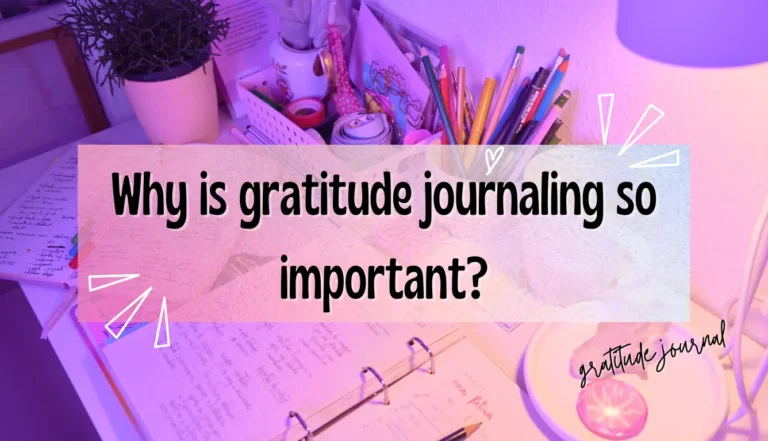How to practice gratitude and Why Is It So Important?
Before diving into practicing gratitude, Let me share a short story with you. I’m an entrepreneur who manages a successful business and cherishes a loving family. Nevertheless, despite my numerous accomplishments, moments of feeling overwhelmed are not uncommon. Yet, a transformative moment awaited me.
During an engaging personal development workshop in New York, I encountered the concept of gratitude’s potency. Intrigued, I decided to experiment, embracing a daily gratitude practice. This became a consistent ritual.
Initially, I faced challenges. Amidst my seemingly chaotic life, I was finding elements to be grateful for proved daunting. However, as I persisted, a remarkable shift occurred. I redirected my focus from the negatives to the positives.
I began noticing the previously overlooked small joys – the morning sunlight’s warmth, my children’s laughter, and my friends’ steadfast support. With sustained gratitude practice, I realized it wasn’t just a fleeting emotion but a transformative mindset, bringing me immense peace and joy.
Through gratitude journaling, I unearthed its transformative impact on my mental health and overall well-being. Each day, I documented three things I appreciated, whether significant or trivial.
This simple practice enabled me to savor the present, nurture relationships, and cultivate resilience in facing challenges. My perspective on life underwent a profound shift, leading to increased fulfillment and contentment.
In this discourse, I’ll explore the concept of gratitude practice, elucidate the importance of thankfulness, and delve into its positive impact on mental health and overall well-being. Additionally, we’ll discuss the advantages of maintaining a gratitude journal as a tool for fostering gratitude.
If you’re ready to embrace the incredible benefits of gratitude, accompany me as we embark on this journey together.
Exploring the Power of Gratitude and Its Effects, on My Mental Health

Gratitude goes beyond being thankful; its impact on my well-being is significant. Embracing a mindset centered on gratitude can greatly influence how I see and approach life leading to a fulfilling existence.
Research shows that regularly practicing gratitude offers health benefits. It helps in reducing stress and anxiety enhances feelings of happiness and satisfaction and builds resilience in facing situations. By focusing on what I appreciate I shift my attention away from negativity fostering an outlook.
A mindset focused on gratitude also fosters self-compassion. Strengthens my relationships with others. Recognizing the positives in my life increases my awareness of the kindness and support I receive from those, around me. This increased sense of connection and appreciation contributes to enhancing the quality of my interactions with others and improving my well-being
“Gratitude turns what we have into enough.”
The Science Behind Gratitude and Mental Health
Research indicates a profound connection between gratitude and mental health. Engaging in the practice of gratitude triggers the release of dopamine and serotonin in our brains, neurotransmitters linked to sensations of joy and overall well-being. These chemical reactions in the brain contribute to a more positive mindset and improved mental and emotional resilience.
Cultivating a Gratitude Mindset
Developing a mindset of gratitude is a journey that involves practice and purposeful intention. Here are some strategies to assist you in cultivating gratitude in your daily life:
- Keep a Gratitude Journal: Make it a habit to jot down three things you’re thankful for each day. This routine shifts your attention towards the positive aspects of your life.
- Practice Mindfulness: Embrace the present moment and take notice of the small joys and blessings surrounding you. Set aside a few minutes daily to savor the beauty of nature, appreciate a kind gesture, or relish a delightful meal.
- Express Gratitude to Others: Dedicate time to thank those who have positively influenced your life. Whether through a heartfelt thank-you note, compliments, or a simple face-to-face expression of gratitude, acknowledging others can have a meaningful impact.
- Engage in Gratitude Affirmations: Incorporate positive affirmations related to gratitude into your routine. Statements like “I am grateful for all the abundance in my life” can contribute to rewiring your brain to focus on the positive
The Power of a Gratitude Mindset
Cultivating a gratitude mindset has far-reaching benefits. It helps improve our mental health, boosts our overall well-being, and enhances our relationships with others. By practicing gratitude regularly and consciously, we can develop a more optimistic outlook, even in the face of challenges. So, let us embrace the power of gratitude and experience the transformative effects it has on our lives.
| Benefits of Cultivating a Gratitude Mindset | Effects on Mental Health |
|---|---|
| Enhanced feelings of happiness and contentment | Reduction in stress and anxiety levels |
| Improved resilience in the face of adversity | Increase in self-compassion and improved relationships |
| Heightened sense of gratitude and appreciation for life | Release of dopamine and serotonin in the brain |
Incorporating Gratitude Into Your Daily Routine

Embracing gratitude as a daily ritual can profoundly influence our overall sense of well-being. Integrating gratitude into our daily lives fosters a positive mindset, leading to increased joy and fulfillment. Here are practical tips and gratitude exercises that seamlessly fit into your day-to-day routine:
- Gratitude Journal: Kickstart your day by jotting down three things you’re grateful for. This simple practice redirects your focus to the positive aspects of life, setting a favorable tone for the day.
- Gratitude Walk: Dedicate a few minutes daily to a gratitude walk. As you stroll, immerse yourself in the beauty around you and express appreciation for the sights, sounds, and nature enveloping you.
- Gratitude Meditation: Allocate a few moments each day to a gratitude meditation. Find a tranquil space, close your eyes, and center your thoughts on the things you’re thankful for. Let the warmth of gratitude fill your heart and mind.
- Random Acts of Kindness: Infuse gratitude into your life by performing spontaneous acts of kindness for others. Small gestures, like holding a door open or sending a thoughtful message, not only brighten someone’s day but also nurture gratitude within yourself.
- Gratitude Affirmations: Commence and conclude your day with gratitude affirmations. Repeat positive statements such as “I am grateful for the abundance in my life” or “I am thankful for the love and support of my family and friends.”
Incorporating these gratitude exercises into your daily routine establishes a consistent practice that enhances your overall well-being and infuses positivity into your life.
I have found that incorporating gratitude into my daily routine has made a significant difference in my mindset and overall happiness. The simple act of pausing to acknowledge the things I am grateful for has helped me cultivate a sense of appreciation and contentment. It’s amazing how a small shift in perspective can have such a powerful impact on our lives.
Daily Gratitude Exercise Tracker
| Date | Morning Gratitude | Afternoon Gratitude | Evening Gratitude |
|---|---|---|---|
| 01/01/2024 | Waking up to a beautiful sunrise | Having a productive work meeting | Enjoying a delicious dinner with loved ones |
| 01/02/2024 | Feeling refreshed after a good night’s sleep | Receiving a kind compliment from a coworker | Having a relaxing evening reading my favorite book |
| 01/03/2024 | Seeing a rainbow after the rain | Completing a challenging workout | Watching a funny movie and laughing with friends |
Use this gratitude exercise tracker to keep a record of the things you are grateful for throughout the day. By tracking your daily gratitude practice, you can monitor your progress and gain insights into the positive aspects of your life.
Keeping a Gratitude Journal

Among the most impactful ways to embrace gratitude is through the practice of maintaining a gratitude journal. This straightforward yet potent ritual enables us to center our attention on the positive facets of our lives, fostering a mindset of appreciation. Through regular reflection on our blessings, we can reshape our outlook, leading to an elevation in overall happiness and well-being.
When embarking on the journey of a gratitude journal, consistency is key. Create a serene and undisturbed space where you can contemplate and write. Initiate the process by daily noting down a few things you’re grateful for, establishing a rhythm that harmonizes with your routine.
“Gratitude turns what we have into enough.” – Melody Beattie
It can be helpful to use prompts to guide your journaling. For example, you can ask yourself questions like:
- What are three things I am grateful for today?
- Who or what made a positive impact on my life recently?
- What challenges or setbacks am I grateful for, as they have helped me grow?
By answering these prompts, you are not only acknowledging the positive aspects of your life but also acknowledging the lessons and growth that can come from challenges.
Additionally, you can use your gratitude journal to reflect on past entries and see how your perspective has evolved over time. This can be a powerful reminder of the abundance and blessings in your life.
| Benefits of Keeping a Gratitude Journal | Prompts for Gratitude Journaling |
|---|---|
| Enhances positive emotions and overall well-being Reduces stress and anxiety Improves sleep quality Boosts self-esteem and self-worth | What made me smile today? Whom do I appreciate having in my life? What small victories did I achieve today? What inspires me? |
By incorporating gratitude journaling into your daily routine, you can develop a more positive mindset and cultivate a sense of appreciation for the present moment. Start your gratitude journal today and experience the transformative power of gratitude.
Using Affirmations to Cultivate Gratitude
Gratitude affirmations serve as potent tools to significantly amplify our capacity for cultivating gratitude. By integrating positive statements and thoughts into our daily rituals, we can reshape our mindset, fostering a deeper appreciation for the abundance and blessings surrounding us. These affirmations function as a mechanism to rewire our brain, steering our focus towards gratitude and enabling us to embrace greater joy, fulfillment, and overall well-being.
But what exactly do gratitude affirmations entail? They are uncomplicated, positive statements meticulously crafted to affirm and strengthen feelings of gratitude within us. Through consistent repetition, these affirmations have the power to reprogram our subconscious mind, fostering a more optimistic and grateful perspective on life.
The research underscores the manifold benefits of gratitude affirmations for our mental health and overall well-being. They play a role in stress and anxiety reduction, bolstering self-esteem, boosting resilience, and enriching our connections with others. By steadfastly incorporating gratitude affirmations into our routine, we can nurture a mindset of abundance and appreciation, catalyzing a profound impact on our daily lives.
Examples of Gratitude Affirmations
- I deeply appreciate the love and support from my family and friends.
- I am thankful for the opportunities that enrich my journey and the wisdom they bring.
- I acknowledge the beauty of nature and the marvels that encompass me.
- I am grateful for my health and the capacity to lead a fulfilling life.
- I appreciate the small acts of kindness that brighten my day.
Through daily repetition, whether silently or aloud, these affirmations can guide your mind to focus on the positive facets of your life, fostering a profound sense of gratitude. Remember, cultivating gratitude is a practice that thrives on consistency and intention.
Practicing Gratitude Through Meditation

Gratitude meditation stands as a potent practice, inviting us to foster a profound sense of appreciation and thankfulness. Integrating meditation into our gratitude routine amplifies its impact on overall well-being.
In the realm of gratitude meditation, our focus pivots towards recognizing and acknowledging the blessings woven into our lives. This intentional and mindful practice becomes a catalyst for developing a heightened sense of gratitude, ultimately contributing to elevated contentment and happiness.
Incorporating gratitude meditation into our daily cadence brings forth manifold benefits. Primarily, it propels us into the present moment, fostering mindfulness and a richer experience of life. By directing our attention to elements of gratitude, we train our minds to spotlight the positive dimensions of our existence.
Furthermore, gratitude meditation has proven efficacy in reducing stress levels and nurturing emotional well-being. The cultivation of gratitude facilitates a shift from a mindset of scarcity to one of abundance, fostering a profound sense of peace and harmony within ourselves.
Ready to embark on effective gratitude meditation? Here’s a simple guide to get you started:
- Create a serene space: Find a quiet and comfortable spot free from distractions.
- Relax and breathe: Close your eyes, take deep breaths, and center yourself in the present moment.
- Invoke gratitude: Bring to mind something or someone you’re grateful for – a person, a situation, or even the simple act of breathing.
- Immerse in appreciation: Focus on the feeling of gratitude, allowing it to envelop your heart and radiate through your body.
- Savor the moment: Stay with this gratitude for a few moments, relishing the experience and letting it permeate your being.
- Maintain focus: If your mind wanders, gently guide it back to the object of gratitude.
- Gradual progression: Practice for a few minutes initially, extending the duration as comfort allows.
Remember, gratitude meditation is personal, with no rigid rules. Discover a method that resonates, adapting it to align with your unique needs.
To deepen your gratitude meditation journey, explore additional techniques such as loving-kindness meditation or body scan meditation. These variations further enrich your sense of gratitude and overall well-being.
Conclusion
In conclusion, practicing gratitude is a powerful tool that can bring about transformative benefits for our mental health and overall well-being. When we actively practice gratitude, whether through journaling, exercises, or meditation, we cultivate a mindset of appreciation and positivity, leading to a higher quality of life.
A daily gratitude practice, such as keeping a gratitude journal, allows us to reflect on the things we are grateful for and helps shift our focus toward the positive aspects of our lives. By taking the time to acknowledge and appreciate the blessings we have, we invite more joy and abundance into our daily experiences.
In addition, incorporating gratitude affirmations into our routines can further amplify the effects of gratitude. By consciously affirming and expressing gratitude for what we have and what we are experiencing, we create a positive mindset that attracts more things to be grateful for.
Furthermore, engaging in gratitude meditation provides us with a powerful tool for deepening our gratitude practice. Through mindfulness and introspection, we can cultivate a sense of gratitude for the present moment and all that it encompasses. This practice enhances our ability to appreciate the small joys in life and fosters a greater sense of overall well-being.
Embarking on a gratitude journey is a personal and transformative process that has the potential to positively impact our lives in profound ways. By making gratitude an integral part of our daily lives, we can cultivate a mindset of appreciation, foster resilience in the face of challenges, and experience a greater sense of fulfillment and happiness.
FAQ
How can I practice gratitude?
There are various ways to practice gratitude. Some common practices include keeping a gratitude journal, expressing gratitude to others, practicing mindfulness, and participating in gratitude exercises.
What are the benefits of gratitude?
Gratitude has numerous benefits for our mental and emotional well-being. It can enhance our overall happiness, reduce stress and anxiety, improve relationships, increase resilience, and promote a more positive outlook on life.
How can I start a gratitude journal?
To start a gratitude journal, find a quiet space and dedicate a few minutes each day to write down things you are grateful for. Focus on specific moments, people, or experiences that brought you joy or made a positive impact on your life. Achieving the maximum benefits from this practice requires unwavering consistency.
What are some gratitude exercises I can try?
There are several gratitude exercises you can incorporate into your routine. These include keeping a gratitude jar, writing a thank-you note to someone, creating a gratitude collage, or engaging in a daily gratitude meditation. Experiment with different exercises to find what resonates with you.
How does gratitude benefit mental health?
Gratitude has been shown to improve mental health by reducing symptoms of depression and anxiety, increasing positive emotions, enhancing self-esteem, promoting better sleep, and reducing the impact of stress. It can help cultivate a more resilient mindset and improve overall psychological well-being.
What are gratitude affirmations?
Gratitude affirmations are positive statements that help shift your mindset to focus on gratitude. They are used to reaffirm feelings of gratitude and appreciation. Examples of gratitude affirmations include “I am grateful for the abundance in my life” or “I appreciate the small joys that bring me happiness.”
How can I practice gratitude through meditation?
Gratitude meditation involves focusing your attention on feelings of gratitude and appreciation. You can start by finding a quiet space, closing your eyes, and bringing to mind things you are grateful for. Allow yourself to fully experience the feelings of gratitude and let them permeate your being.


